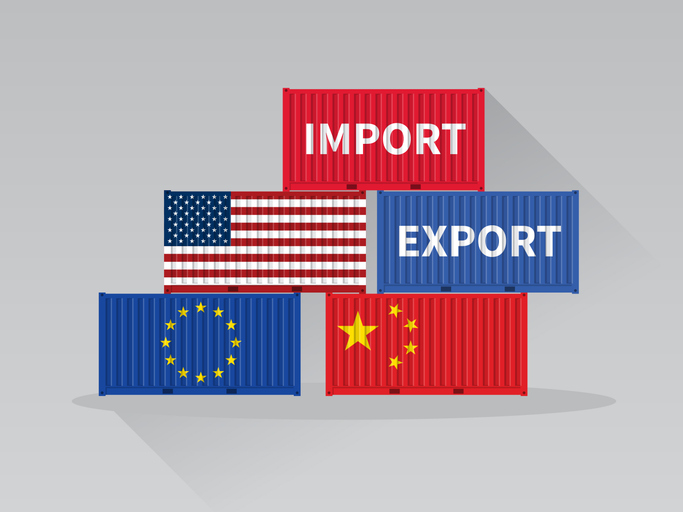Trump's Tariff Plans Could Trigger a £22 Billion Hit to UK Exports and Global Economy
The impending implementation of Donald Trump’s proposed tariffs could result in a significant shake-up of global trade, with the UK particularly vulnerable to a £22 billion loss in exports, according to new analysis from the University of Sussex's Centre for Inclusive Trade Policy (CITP). Economists warn that a comprehensive 20% tariff on all imports, coupled with a steep 60% tariff on Chinese goods, could severely disrupt not only UK exports but also the broader global economy.
The potential economic fallout from Trump's tariffs would ripple through multiple sectors of the UK economy, including fishing, petroleum, pharmaceuticals, and electrical industries. But the ramifications could extend even further. Service-based businesses that rely on robust international trade—such as transportation, insurance, and finance—could also suffer losses. Meanwhile, some sectors, including textiles and clothing, may find new opportunities as reduced Chinese competition opens up markets.
As Trump prepares to take office for his second term, his promises to overhaul international trade agreements are poised to create significant challenges for countries around the world, including the UK. Economists predict that these tariffs could have an annual economic impact of 0.8% on the UK’s overall output. This article examines the proposed tariffs, their potential effects on the global economy, and how the UK and its allies are preparing to mitigate the damage.
What Are Tariffs and How Do They Work?
A tariff is essentially a tax imposed on imports or exports between countries. When a government imposes a tariff on imports, it raises the price of foreign goods, making them more expensive for domestic consumers and businesses. The objective behind tariffs is often to protect domestic industries from foreign competition by making imported goods less attractive.
In the case of President-elect Donald Trump, his campaign promises included imposing a universal tariff of 20% on all imports into the U.S., as well as a 60% tariff specifically on products from China. The rationale behind these proposals is to protect American jobs and industries by encouraging domestic production and reducing dependence on foreign goods. However, these tariffs could also lead to higher prices for U.S. consumers and have a ripple effect on economies worldwide.
The proposed tariff structure—particularly the higher tariff on Chinese goods—could alter the dynamics of global trade, reducing the flow of goods between major economies like the U.S., China, and the UK. While Trump has made these tariff plans a key part of his economic strategy, the exact implementation remains uncertain. If these tariffs are enacted, however, experts warn of significant consequences for global trade, particularly for countries with deep economic ties to the U.S.
How the UK Could Be Affected: A £22 Billion Loss
The UK, which exports billions of pounds worth of goods to the United States annually, is highly vulnerable to the impact of Trump's tariff plans. According to research by the CITP, UK exports could see a decline of 2.6% as a result of reduced trade with the U.S. and the ensuing global repercussions. This drop could translate into a £22 billion loss, which would be a major blow to the UK economy, particularly in sectors such as fishing, petroleum, and pharmaceuticals, which could experience a sharp 20% reduction in exports.
The impact of such a downturn would be felt across the UK economy, from manufacturing to services. While industries like textiles may benefit from a reduction in Chinese competition, the overall effect of the tariffs is likely to be negative. With the U.S. potentially imposing tariffs on a wide range of imports, businesses across the UK will face increased costs and reduced access to critical markets.
In addition to these direct effects, businesses that do not export directly to the U.S. could still feel the repercussions. Companies in transportation, logistics, and finance—sectors that are closely tied to the global trade network—may find themselves grappling with disruptions in supply chains, higher operating costs, and a slowdown in overall trade activity. These knock-on effects could add further strain to the UK economy.
The Global Repercussions: A Shift in Global Trade Dynamics
If Trump follows through on his tariff plans, the impact won’t be limited to the UK. Economists predict that global trade could face a sharp contraction, with emerging markets and developing economies taking the brunt of the damage. According to the International Monetary Fund (IMF), a large-scale trade war between the U.S. and other countries could lead to a global economic contraction of 7%, which is equivalent to the combined economic output of France and Germany.
The IMF has warned that such a scenario would drive up inflation, reduce consumer purchasing power, and create significant instability in international markets. Countries that rely heavily on trade with the U.S. and China—such as Mexico, Canada, and many Asian nations—could face severe economic disruptions, leading to widespread job losses and higher prices for goods and services.
On a global scale, industries like electronics, textiles, and automotive manufacturing could be hit particularly hard. These industries rely on intricate global supply chains that span multiple continents, and the imposition of tariffs could severely disrupt production schedules and increase costs. Many companies would be forced to either absorb the higher costs or pass them on to consumers, further exacerbating inflationary pressures.
Related: China Braces for a Trump Trade Tsunami: Tariffs, Tech Battles, and Taiwan Showdown on the Horizon
How the UK Is Preparing: Negotiations and Trade Alliances
In response to the looming tariff threat, UK officials are preparing for a challenging diplomatic negotiation with the U.S. While some diplomats believe that Trump will seek to protect allies from the worst impacts of his tariff strategy, others remain cautious about the potential for global trade disruption.
Foreign Secretary David Lammy has stressed that the UK must work to ensure that its relationship with the U.S. remains strong, despite the potential for increased tariffs. He pointed out in an interview with the BBC’s Newscast podcast that efforts will be made to convey to the U.S. that harming its closest allies, like the UK, will have long-term negative consequences. "It’s in the U.S.'s interest to maintain strong relationships with its allies," Lammy said, "and we will do everything we can to demonstrate that imposing such tariffs would not serve their best interests."
Additionally, Lord Darroch, the former British ambassador to the U.S. during Trump’s previous term, has expressed concerns about the feasibility of avoiding the full impact of the tariffs. "Trump is committed to these policies," Darroch stated on BBC Newsnight. "His imposition of tariffs on steel and aluminum during his first term was just a precursor. He is likely to follow through on his promise to raise tariffs significantly."
As tensions over trade continue to mount, the UK may find itself needing to forge new agreements with the U.S. to mitigate the negative effects of these proposed tariffs. Chancellor Rachel Reeves and Bank of England Governor Andrew Bailey have both reaffirmed their commitment to free trade and maintaining strong trade relationships with the U.S.
Related: Steve Madden Takes a Bold Step, Cutting Ties with China in Response to Trump’s Proposed Tariffs
UK Trade Talks with the U.S.
While the outlook may seem grim, there is a potential silver lining for the UK. Duncan Edwards, the chief executive of BritishAmerican Business, suggested that the UK could benefit from renewed free trade talks with the U.S. should Trump return to the White House. He noted that Trump’s administration might focus its tariff strategy primarily on China, rather than targeting the UK directly. "The UK is not the target," Edwards said, pointing out that there could be an opportunity for the UK to re-enter negotiations for a free trade agreement, much like the discussions that stalled under President Joe Biden due to concerns over Northern Ireland and post-Brexit regulations.
The UK government is also considering various scenarios, including negotiating a side agreement with the U.S. or collaborating with European and Western allies to present a united front. Such cooperation could help ensure that the U.S. understands the broader economic repercussions of its tariff policies, which could ultimately hurt American exporters as well as foreign partners.
The Road Ahead: Navigating the Challenges of Tariff Wars
As President-elect Trump’s tariff plans loom large on the horizon, the UK and other global economies are facing a period of uncertainty and upheaval. While some sectors may benefit from reduced competition, the overall impact of these tariffs is likely to be negative for most industries. The global economy could slow down, inflation could rise, and trade relationships could be fundamentally altered.
The UK’s approach to this challenge will be critical in determining how well it can weather the storm. By engaging in diplomatic negotiations with the U.S. and working closely with its European and international allies, the UK has the potential to mitigate some of the worst effects of Trump’s tariff strategy. However, the road ahead will be fraught with challenges, and businesses across the country will need to adapt to a rapidly changing global trade environment.












